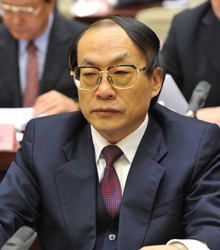| Former Minister Expelled
 |
|
(XINHUA) |
Liu Zhijun, China's former railway minister, was expelled from the Communist Party of China (CPC) for serious violation of Party discipline in late May, according to the Central Commission for Discipline Inspection (CCDI) of the CPC, the party's disciplinary watchdog.
Liu had been under investigation since February 2011, when he was removed from his position. An investigation by the CCDI found Liu used his position to seek substantial illegal interests for Ding Yuxin, Chairman of Beijing Boyou Investment Management Corp., a move which caused great economic losses of the country and negative social influence. The CCDI also discovered Liu had taken a huge amount of bribes and bore major responsibility for severe corruption in the railway system. His illegal gains were confiscated.
It is suspected that some of Liu's disciplinary violations may have included criminal acts, so his case will also be turned over to judicial system.
After assuming the post of railway minister in 2003, Liu was responsible for the multibillion-dollar investment in China's railway network and construction of high-speed lines.
Boosting Private Investment
China is making all-out efforts to encourage private investment in more heavily statecontrolled and monopolized sectors amid concerns that its economy might slow further in the coming months.
Since China's transport, railway and health ministries issued guidelines in April to permit private capital to enter those sectors, the banking sector and state-owned enterprises have joined the drive.
The move came in line with other recent measures announced by the Central Government to open state-controlled and monopolized sectors wider to private investment, in a bid to stimulate tepid economic growth.
Detailed rules concerning private investment in more monopolized industries, such as electricity, oil and natural gas are currently being drafted, said an official with the National Development and Reform Commission.
Direct Yuan-Yen Trading
Direct trading of the Chinese currency against the Japanese yen kicked off on June 1, both in Shanghai and Tokyo, bringing the yuan one step closer to becoming a truly global currency.
The trading marks the first time for China to allow a major currency other than the U.S. dollar to be traded directly against the yuan.
As part of efforts by China and Japan to strengthen cooperation in developing the financial market, the move serves as an important means of promoting direct yuan-yen trading, the People's Bank of China said in a statement on its website.
The central parity rate of the yuan against the yen will be based on the average price of offers made by registered dealers before the opening of the market each business day.
Largest Consumer Market
China is expected to become the world's largest consumer market in 2015, said Chen Deming, Minister of Commerce.
Retail sales will surpass $5 trillion in 2015 amid an accelerated urbanization rate and the rise of residents' incomes, Chen said at the opening ceremony of the first Beijing International Fair for Trade in Service.
Demand for home services, education and training, medical care, financing, technology and tourism is booming, he said.
RMB Currency Futures
Hong Kong Exchanges and Clearing Ltd. (HKEx) received approval from the Securities and Futures Commission on May 28 to offer renminbi currency futures.
The plan will be introduced in the third quarter of 2012. HKEx renminbi currency futures will be the first exchange-traded currency futures settled in renminbi. They will require delivery of U.S. dollars by the seller and payment of the final settlement value in renminbi by the buyer upon maturity.
Contracts will be quoted in renminbi per U.S. dollar and margined in renminbi, with the trading and settlement fees charged in renminbi. The final settlement price of the contracts will be based on the spot fixing published by the Treasury Market Association at 11:15 am on the last trading day.
Train Tech Export
A Chinese electric locomotive manufacturer has delivered the electric traction system, the network control system and traction motor of electric bullet trains to Georgia, according to a statement issued by the Zhuzhou Institute of China South Locomotive and Rolling Stock Corp. Ltd.
The delivery signaled that China has become an exporter of such core technology.
The company designed and produced the exported traction transmission system and the network control system, regarded as the "heart and brain" of electric multiple units, or multicar electric bullet trains.
The locomotives will be used in bullet trains traveling at a speed of 120 km per hour between Georgian cities in the mountainous Caucasus region, according to the statement. | 